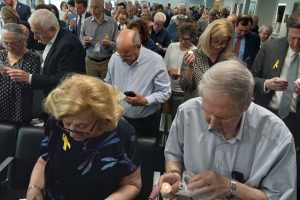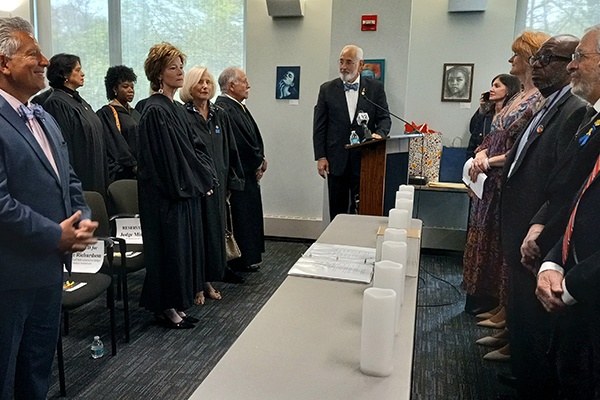|
RCBJ-Audible (Listen For Free)
|
Holocaust Remembrance Day Is Both The Marking Of Tragedy & A Warning About Its Repeat
By Tina Traster
The 14th annual Yom HaShoah 2025 ceremony, held Thursday in the packed Juror’s Room in the Rockland County Courthouse, was freighted with concern over rising antisemitism nationally and worldwide, ongoing unrest in the Middle East, and a court system at home that is being pushed to the brink.
Nearly every speaker at the event, which was named “Standing Up Against Injustice,” referenced how the Holocaust would have been impossible without the breakdown of the judiciary during Hitler’s campaign to eradicate six million Jews in Nazi Germany.
And though speakers steered clear of specifically talking about American politics, they were unequivocal in their warnings about what happens when the guardrails upholding the rule of law fail.
“Each year we gather not only to remember six million Jews murdered in the Holocaust, but also to reflect on how a civilized society can descend into barbarism – not overnight, but step by step, law by law, and verdict by verdict,” said Paul Adler, a commercial real estate professional, philanthropist, and involved member of the Jewish community, who led the commemoration with poignancy, pathos, and flashes of levity. Adler, who chaired Yom HaShoah 2025, was joined by co-sponsors from the Justice Brandeis Law Society 9th Judicial District, the Rockland County Bar Association, and the Holocaust Museum and Center for Tolerance and Education.
Yom HaShoah, translated from Hebrew as “Holocaust Remembrance Day,” is an internationally recognized date that marks the anniversary of the Warsaw Ghetto Uprising in 1943.
 Speaking among a gathering of robed judiciary members, along with more than 300 community members, Adler pointed his comments to the fragility of democracy, an issue that is front and center in daily conversations at dinner tables, in synagogues, and among strangers.
Speaking among a gathering of robed judiciary members, along with more than 300 community members, Adler pointed his comments to the fragility of democracy, an issue that is front and center in daily conversations at dinner tables, in synagogues, and among strangers.
“We often think of judges as impartial arbiters, protectors of rights, defenders of constitutions,” he continued. “But what happens when that institution, meant to uphold justice, pledges allegiance not to the law but to a leader? In Nazi Germany, judges and lawyers – many of whom had trained in one of the most sophisticated legal systems in the world, abandoned their oaths to the constitution. Instead, they swore loyalty to Adolf Hitler. When the judiciary collapsed, so did the democratic Weimar Republic. The courts because instruments of oppression, legitimizing persecution, and providing a legal veneer for tyranny.”
Justice Hon. Anne E. Minihan, an administrative judge in the Ninth Judicial District, said it’s not enough to look back.
“In teaching ourselves to be stewards of democracy, we need to look forward and to look within and, in doing so, acknowledge that the Holocaust was not inevitable,” she said. “It occurred because too few people, groups and nations stood up and too many people, groups, and nations, stood by.”
Like Adler, Minihan said that the Holocaust didn’t happen overnight.
“As good people normalize undemocratic practices, the systemic vulnerabilities of democratic institutions are exploited, and then poof, they’re gone.”
Americans, who are moving toward the 250th celebration of the nation’s founding, are gauging the resilience of the judiciary to withstand unprecedented challenges. Speakers at the mostly somber Yom HaShoah ceremony were aiming to galvanize a community that has likely not experienced first-hand the disintegration of democratic practices at an existential scale.
“An independent judiciary stands at the line that demarcates where constitutional democratic institutions end, and authoritarian regimes begin,” Minihan added.
At times, Adler as the master of ceremonies, acknowledged the recent loss of three giants: Pope Francis, Congresswoman Nita Lowey, and Judge Al Weiner. He also paid tribute to both the keynote speaker, Joseph A. Zayas, the Chief Administrative Judge of the New York State Unified Court System, and to Talia Pierson, a Yorktown Heights high school sophomore who heads up the Justice Brandeis Law Society Junior Board.
In his tribute to the remembrance of the Holocaust, Zayas said the world at the time remained muted and silent. He related an inspiring story about a group in Denmark that risked their safety to ferry Jews to safety in Sweden.
“It was the right thing to do so they did it,” he said. “It was the right thing to do – simple as that.”
The Yom HaShoah 2025 event drew many prominent Jews, Holocaust survivors, elected officials, and community members who stand together to reinforce the veracity and horrors of the Holocaust as warning for future generations.
“Making a second appearance at the annual ceremony, Pierson said “the memory and the lessons of the Holocaust seems to slip further away. As fewer survivors are alive, Holocaust denial and distortion rise; our most prestigious institutions remain infected with antisemitism, and Jews and Israelis worldwide continue to be attacked on the basis of their identities.”
The ceremony rounded out with a candle-lighting ceremony. The audience collectively read a pledge to uphold the U.S. Constitution. Virginia Norfleet, founder and CEO of Haverstraw African American Connection and Andrea Winograd, Executive Director of the Holocaust Museum, spoke jointly of their ongoing crusade to educate school children.











